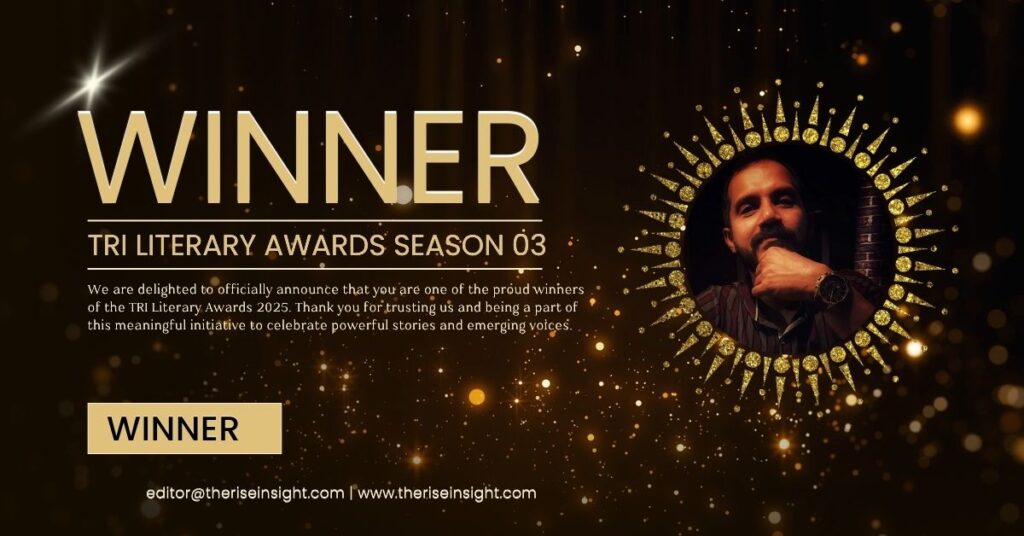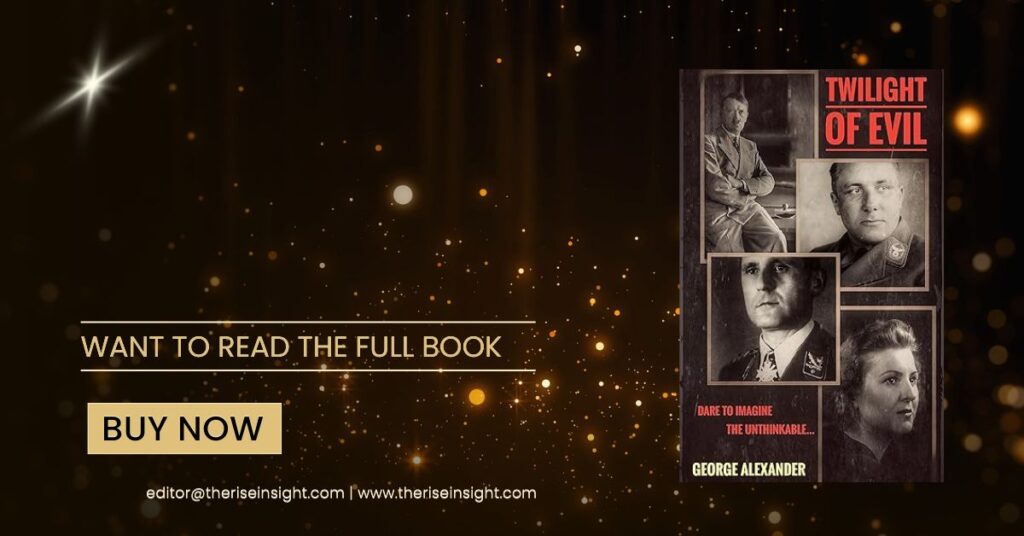
With immense pride and admiration, we extend our warmest congratulations to George Alexander, whose gripping and thought-provoking novel Twilight of Evil has rightly earned its place as a TRI Literary Award winner. This recognition is a testament to the depth of research, narrative intensity, and socio-political commentary embedded in this masterful work of historical fiction. The book stands as both a literary achievement and a reflection of the haunting complexities of truth, memory, and power.
📖 Review of Twilight of Evil by George Alexander
In a literary landscape crowded with tales of war, conspiracy, and alternate histories, Twilight of Evil by George Alexander emerges as a provocative, meticulously researched, and emotionally charged novel that dares to confront one of the most sinister “what ifs” in modern history: What if Adolf Hitler didn’t die in Berlin, but escaped and continued his quest for domination from the shadows?
From its chilling premise to its poignant human moments, this book is more than an alternate history—it’s a psychological and ethical investigation into the nature of evil, complicity, and truth.
🔍 A Premise That Challenges the Mind and Morality
The central hypothesis of Twilight of Evil is both bold and unsettling. It imagines that Adolf Hitler did not commit suicide in his bunker in 1945, but instead escaped with Eva Braun, Martin Bormann, and Heinrich Müller to South America, a theory that has persisted on the fringes of historical debate. However, Alexander isn’t simply indulging in conspiracy for the sake of sensationalism. Rather, he uses this hypothetical escape as a prism to examine deeper truths: the human capacity for denial, the allure of absolute power, and the societal mechanisms that allow evil to fester and thrive.
What sets this novel apart is how thoroughly it is rooted in real-world history and scholarship. Alexander references actual intelligence reports, sightings, and post-war theories that keep the reader grounded while gradually expanding into a more imaginative—and haunting—narrative space.

🕵️♂️ A Hero’s Journey with David Hazel
The novel’s emotional core lies with David Hazel, a young Jewish researcher driven by both curiosity and personal history. Through Hazel, readers are taken on a relentless quest for truth. His investigations into the documents and findings of Dr. Peter Alex, a renowned American scholar, form the backbone of the narrative.
David is not just a literary device to drive the story—he is a deeply human character, battling trauma, doubt, and intellectual obsession. His pursuit of Hitler’s shadow becomes a metaphor for the lingering pain of the Holocaust and the unhealed wounds left in the Jewish psyche. Hazel’s interactions with Holocaust survivors, intelligence officers, and war historians add weight and authenticity to the narrative.
🧠 Multiple Layers of Narrative and Historical Depth
What makes Twilight of Evil exceptional is how Alexander blends fictional storytelling with real historical documents, events, and figures. The novel brings to life the final chaotic days of the Third Reich in such harrowing detail that it borders on historical reportage. The bunkers, the SS officers, the desperation—all are painted vividly and with uncanny accuracy.
As the story transitions to post-war South America, it doesn’t lose its pace or purpose. Instead, it transforms into a political thriller that deals with clandestine Nazi networks, secret alliances, and the ethical dilemmas of global politics. The question that emerges is no longer just “Did Hitler escape?” but “Why was the world willing to let him disappear?”
💣 The Darkness That Lingers
Despite being steeped in the darkest chapters of human history, Twilight of Evil is not just about past horrors. It reflects on how the ideology of hate, once ignited, doesn’t simply die with its leader. The notion of a post-war Hitler hiding, perhaps plotting, in a foreign land is chilling—but more terrifying is the suggestion that his ideas still have followers.
George Alexander doesn’t shy away from showing the ways in which societies can be complicit in the survival of evil. Governments that turn a blind eye, communities that offer refuge, and ideologies that mutate to survive—all are explored in subtle yet powerful ways.
✍️ A Literary Triumph in Style and Substance
Alexander’s writing is a delicate balance of literary elegance and journalistic clarity. His prose is crisp, evocative, and carries emotional gravity. There are moments where the narrative slows to allow introspection—particularly through David Hazel’s internal monologues—and others where the plot charges forward with suspense and urgency.
His background in philosophy and social transformation shines through in the book’s deeper musings. There are no easy villains or heroes here; instead, every character is layered, complex, and reflective of real-world ambiguity.
🌍 A Global Narrative with Personal Impact
From Berlin’s ruins to the jungles of South America, the novel is global in scope. Yet, Alexander never loses sight of the individual. The Jewish families searching for closure, the former Nazis clinging to delusion, the historians piecing together dangerous truths—all are drawn with empathy and depth.
The dialogues are particularly impactful. They don’t just serve to advance the plot; they provoke thought. A conversation between Hazel and an aging Nazi official or between survivors of Auschwitz brings out truths about memory, justice, and human resilience that echo long after the book is closed.
📚 Why This Book Matters Today
In an era marked by the resurgence of extremist ideologies and historical revisionism, Twilight of Evil is not just a historical novel—it is a moral reckoning. It forces readers to confront uncomfortable possibilities, to reflect on the fragility of truth, and to recognize the dangers of forgetting history.
The book is a stark reminder that the past is never truly past. It lives in the archives, in the survivors, and in the ideologies that still seek validation.
Certainly! Here’s feedback from each of the nine reviewers after reading Twilight of Evil by George Alexander:
1. Prashant Sahu:
“Twilight of Evil is an explosive reimagining of history that kept me riveted from beginning to end. George Alexander blends fact and fiction so seamlessly that I often forgot I was reading a novel. The psychological depth he brings to the characters, especially David Hazel, made this story hauntingly real. It’s a chilling reminder of how history can be twisted—and why we must always seek the truth.”
2. Sameer Gudhate:
“What makes this book extraordinary is not just the speculative premise but the emotional layers packed into it. The portrayal of Hitler’s escape is masterfully done, but what really moved me was the journey of David Hazel. His search isn’t just for facts, but for closure, justice, and understanding. Alexander has crafted a thought-provoking thriller that challenges readers to question historical narratives.”
3. Apeksha Gupta:
“This is not just a story about Hitler—it’s a deeply human story about grief, trauma, and the legacy of evil. George Alexander writes with such empathy and intelligence that I often found myself pausing to reflect. The book’s pacing, atmosphere, and attention to historical detail are impeccable. It’s a terrifying, brilliant ‘what if’ that feels disturbingly possible.”
4. Akansha Sinha:
“Reading Twilight of Evil felt like walking a tightrope between historical reality and speculative fiction. The research behind this book is commendable, and the way Alexander weaves historical facts with narrative suspense is remarkable. I was particularly impressed by how sensitively the Holocaust and its aftermath were portrayed through the eyes of David Hazel. A gripping and necessary read.”
5. Glenville Asbhy:
“George Alexander’s voice is fearless. He dares to explore a taboo possibility and does so with intellectual rigor and moral clarity. This is not a book that glorifies evil—it exposes it, interrogates it, and shows its lingering consequences. The philosophical undertones, the ethical questions, and the political nuances make this novel a powerful commentary on truth, denial, and historical responsibility.”
6. Pooja Sahu:
“Twilight of Evil left me stunned. The narrative is sharp, unsettling, and surprisingly intimate. As a reader, I was drawn to the psychological dimensions of both the persecutor and the pursuer. The post-war setting in South America added a unique twist to the narrative, and the portrayal of secret networks protecting war criminals was deeply disturbing. A bold, unforgettable book.”
7. Versha Singh:
“This novel proves why George Alexander is a master of thought-provoking storytelling. While the premise is controversial, the execution is respectful, intelligent, and deeply moving. Hazel’s pursuit of truth mirrors our collective struggle to make sense of the horrors of the past. I appreciated the moral complexity and the message that silence and inaction can be as dangerous as complicity.”
8. Shivangi Yadav:
“There’s something profoundly unsettling yet necessary about Twilight of Evil. The writing is compelling, the characters are nuanced, and the subject matter is handled with incredible care. I was especially moved by the intergenerational trauma explored through David’s journey. This is more than historical fiction—it’s a cautionary tale about the price of forgetting.”
9. Kavita Kaushik:
“Few books have shaken me like this one. The narrative momentum, the chilling possibility of Hitler’s escape, and the emotional resonance all make for an unforgettable reading experience. George Alexander doesn’t just write history—he reimagines it in a way that forces readers to confront uncomfortable truths. A compelling, courageous, and profoundly intelligent novel.”
🏆 Final Thoughts: A Deserving Award-Winner
With Twilight of Evil, George Alexander has accomplished something rare. He’s crafted a book that is intellectually compelling, emotionally resonant, and unflinchingly bold. It entertains, informs, and unsettles—all at once. The narrative ambition is matched by rigorous research and philosophical depth.
Winning the TRI Literary Award is not just a feather in the author’s cap—it is a recognition of a voice that dares to tell stories that matter, stories that challenge and stories that don’t flinch from the shadows of history.
🥂 Congratulations Once Again, George Alexander!
Your work is a beacon in the ever-expanding universe of historical fiction. Twilight of Evil stands as a reminder of the power of literature to investigate truth, unsettle complacency, and inspire critical dialogue.
May this award be just the beginning of many accolades to come. You’ve not only told a remarkable story—you’ve sparked an important conversation.
#TwilightOfEvil #GeorgeAlexander #TRILiteraryAwards2025 #HistoricalFiction #WhatIfHistory #BookReview #LiteraryExcellence #TruthAndFiction #MustRead #HitlerEscape #BookLovers #AwardWinningNovel



